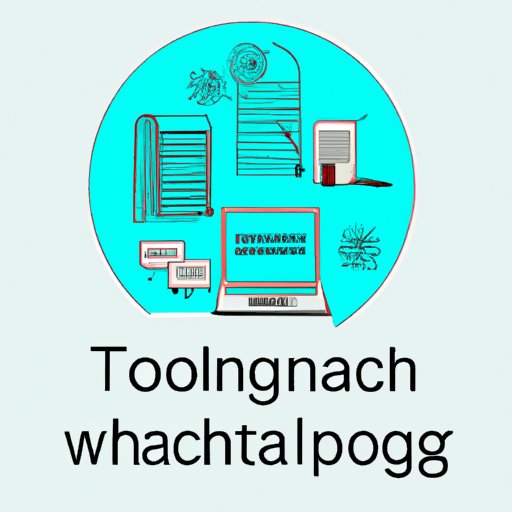Introduction
Technical writing is a specialized form of writing that involves creating documents for a variety of industries. Technical writers create user manuals, online help documents, product descriptions, and other materials that are used by consumers, businesses, and technical professionals. Becoming a technical writer requires certain qualifications and skills, so it’s important to understand what it takes to become successful in this field.

Steps to Becoming a Technical Writer
If you’re interested in becoming a technical writer, there are several steps you should take to ensure your success. These include researching the field, obtaining education and certifications, developing your writing portfolio, and networking with other writers.
Research the Field
The first step to becoming a technical writer is to research the field. Understand the different types of technical writing and the industries they cover. Learn about the tools and technologies used in the industry, and familiarize yourself with the various styles of writing used in technical documents. Researching the field will help you determine if this is the right career path for you.
Obtain Education and Certifications
Most employers require technical writers to have at least a bachelor’s degree in English, communication, or a related field. If you don’t already have a degree, consider taking classes or earning an online degree in one of these areas. You can also pursue certifications from organizations such as the Society for Technical Communication (STC). This will help demonstrate your expertise and knowledge of the field.
Develop Your Writing Portfolio
Building a strong writing portfolio is essential if you want to land jobs as a technical writer. Create samples of your work and showcase them on your website or blog. Include examples of instructional documents, user manuals, press releases, and other materials you have written. This will give potential employers a sense of your style and ability.
Network with Other Writers
Networking with other technical writers is another important step in becoming a successful technical writer. Join professional networks and attend events where you can meet and connect with others in the industry. This will help you stay informed about trends and find job opportunities.
What to Expect in a Day as a Technical Writer
A day as a technical writer typically involves understanding the client’s needs, working with different mediums, and using teamwork to create quality content. As a technical writer, you will work closely with clients to understand their needs and develop documents that meet their requirements. You may also need to collaborate with other writers and editors to ensure accuracy and consistency in the final product.
Understanding the Client’s Needs
Your primary responsibility as a technical writer is to understand the client’s needs and create documents that meet those needs. You will need to be able to interpret complex concepts and translate them into clear, easy-to-understand language. You may also be responsible for conducting research and gathering data to ensure accuracy.
Working With Different Mediums
Technical writers often work with a variety of mediums, including text, audio, video, and images. You may need to create visuals such as diagrams or flowcharts to supplement your documents. You may also need to use audio or video to create tutorials or webinars. It’s important to be comfortable working with different mediums.
Using Teamwork to Create Quality Content
Teamwork is essential when creating content as a technical writer. You may need to collaborate with other writers, editors, and designers to ensure accuracy and consistency in the final product. Working as part of a team will help you create higher quality documents that meet the client’s needs.

Benefits of a Career as a Technical Writer
A career as a technical writer offers a number of benefits, including job security, flexibility, and growth opportunities. Technical writing is in high demand, so you can rest assured that there will be job opportunities available. Additionally, you can often work remotely or set your own hours, giving you the flexibility to work around other commitments.
Job Security
Technical writing is a growing field, and there is always a demand for skilled writers. Companies need technical writers to create user manuals, product descriptions, and other materials, so you can rest assured that there will be job opportunities available.
Flexibility
As a technical writer, you often have the option to work remotely or set your own hours. This allows you to work around other commitments, such as family or school. Additionally, many companies allow technical writers to work on a freelance basis, giving you the freedom to choose which projects you work on.
Growth Opportunities
Technical writing is a dynamic field with plenty of room for growth. As you gain experience, you can move up to more senior roles, such as editor or content strategist. Additionally, you can specialize in a particular field, such as medical writing or software documentation. This allows you to hone your skills and increase your earning potential.

Essential Resources for Technical Writing
There are a number of resources available to help you become a successful technical writer. These include software and platforms, professional organizations, and training courses.
Software and Platforms
There are a number of software and platforms available to help you create documents. Popular options include Microsoft Word, Adobe InDesign, and Google Docs. Additionally, there are a number of tools available to help you create visuals, such as diagrams and flowcharts.
Professional Organizations
Joining a professional organization is a great way to stay informed about trends in the industry and connect with other writers. Popular organizations include the Society for Technical Communication (STC) and the American Medical Writers Association (AMWA). These organizations offer helpful resources and job boards for members.
Training Courses
Taking a training course is a great way to learn the basics of technical writing and hone your skills. There are a number of courses available online, such as the Technical Writing Certificate Program offered by the University of California, Berkeley Extension. Taking a course will help you understand the fundamentals of technical writing and give you the confidence to tackle any project.
Challenges of Technical Writing
While technical writing can be a rewarding career, there are some challenges to consider. These include meeting deadlines, staying current on industry trends, and writing clarity and accuracy.
Meeting Deadlines
Deadlines are a reality for any writer, but as a technical writer, you must often meet tight deadlines. This means you need to be organized and efficient in order to meet all of your deadlines. Additionally, you must be able to quickly adapt to changes in direction or scope of the project.
Staying Current on Industry Trends
The technical writing field is constantly evolving, so it’s important to stay current on industry trends. Read blogs and publications related to the field, follow industry leaders on social media, and attend conferences and seminars. Staying up to date on industry trends will help you stay ahead of the curve and remain competitive.
Writing Clarity and Accuracy
Technical writing requires a high level of clarity and accuracy. You must be able to write clearly and concisely, and you must also be able to convey complex concepts in an understandable manner. Additionally, you must be able to fact check and verify information to ensure accuracy.
Conclusion
Becoming a technical writer requires certain qualifications and skills, and there are a number of steps you should take to ensure your success. Understanding the client’s needs, working with different mediums, and using teamwork to create quality content are all part of a day as a technical writer. Additionally, there are a number of benefits to a career as a technical writer, including job security, flexibility, and growth opportunities. However, there are also challenges to consider, such as meeting deadlines, staying current on industry trends, and writing clarity and accuracy. With the right qualifications, skills, and resources, you can become a successful technical writer.
(Note: Is this article not meeting your expectations? Do you have knowledge or insights to share? Unlock new opportunities and expand your reach by joining our authors team. Click Registration to join us and share your expertise with our readers.)
